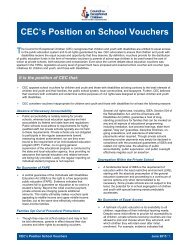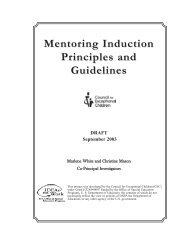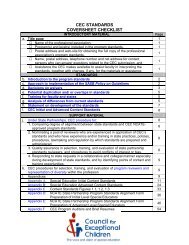What Every Must Know Special Educator - Council for Exceptional ...
What Every Must Know Special Educator - Council for Exceptional ...
What Every Must Know Special Educator - Council for Exceptional ...
You also want an ePaper? Increase the reach of your titles
YUMPU automatically turns print PDFs into web optimized ePapers that Google loves.
Section Three - Part 1<br />
Basic Commitments and<br />
Responsibilities to <strong>Exceptional</strong><br />
Children<br />
ChAPTER 01<br />
RESPONSIBILITIES OF ThE COuNCIL FOR<br />
EXCEPTIONAL ChILDREN<br />
Paragraph 1- Purpose<br />
Appendix 9: CeC profeSSionAl poliCieS<br />
The <strong>Council</strong> <strong>for</strong> <strong>Exceptional</strong> Children is an association<br />
of professional and other persons whose principal<br />
purpose is to obtain opti¬mal educational opportunity<br />
<strong>for</strong> all children and youth with exceptionalities.<br />
These children’s needs differ sufficiently from other<br />
children’s so that they require special educational and<br />
related services in addition to those presently available<br />
through regular education programs and other human<br />
service delivery systems. While the legal criteria that<br />
define children and youth with exceptionalities vary<br />
greatly from one governmental jurisdiction to another,<br />
The <strong>Council</strong> <strong>for</strong> <strong>Exceptional</strong> Children is primarily<br />
concerned about children and youth having sensory<br />
deficits, physical handicaps, mental retardation, behavioral<br />
disorders, communication disorders, special<br />
learning disabilities, multiple handicaps, gifts and talents,<br />
and children who are developmentally delayed<br />
or abused and neglected. Children and youth with<br />
exceptionalities are found in all communities regardless<br />
of socioeconomic or cultural factors.<br />
Paragraph 2 - Governmental Relations<br />
Public policy legislation, litigation, appropriation,<br />
regulation, and negotiated agreements are the means<br />
by which children and youth with exceptionalities<br />
have been guaranteed the educational opportunities<br />
of our society. The <strong>Council</strong> is deeply committed to<br />
the effective implementation of existing public policy<br />
in the interest of children and youth with exceptionalities.<br />
In addition, The <strong>Council</strong> seeks extension and<br />
creation of public policy in a manner which will encourage<br />
and augment quality service programs at all<br />
governmental levels. To provide the scope and kind of<br />
services needed, The <strong>Council</strong> endorses public policies<br />
that strengthen and enhance instructional programs<br />
<strong>for</strong> all children and youth. While such general provisions<br />
should benefit the exceptional child, The <strong>Council</strong><br />
believes that specific policy provisions are necessary to<br />
offer those children and youth with exceptional needs<br />
the opportunity to develop to their fullest potential. In<br />
carrying out its governmental activities, The <strong>Council</strong><br />
will be guided by the policies adopted by its members<br />
and by the directives of its governance.<br />
Paragraph 3 - Advocacy by Members<br />
The <strong>Council</strong> believes that all persons concerned about<br />
the education of children and youth with exceptionalities<br />
must initiate and maintain ef<strong>for</strong>ts to ensure that appropriate<br />
public policy is adopted, fully implemented,<br />
and en<strong>for</strong>ced.<br />
The <strong>Council</strong> recognizes that the provision of public<br />
services to children and youth with exceptionalities<br />
is a function of the governmental process. For this<br />
reason, The <strong>Council</strong> urges and supports the active<br />
involvement of its members in activities which will<br />
build greater awareness on the part of parents, communities,<br />
and governmental officials regarding the<br />
needs of children and youth with exceptionalities and<br />
will extend appropriate in<strong>for</strong>mation to such bodies in<br />
their ef<strong>for</strong>ts to carry out the objectives of this policy<br />
statement.<br />
The <strong>Council</strong> believes that it is the responsibility of all<br />
persons concerned about the needs of children and<br />
youth with exceptionalities to continually seek to<br />
improve government provisions <strong>for</strong> their education.<br />
In this regard, The <strong>Council</strong> pledges its assistance in<br />
providing needed in<strong>for</strong>mation and in helping to develop<br />
the necessary strategies to attain improvement<br />
of educational services <strong>for</strong> children and youth with<br />
exceptionalities.<br />
In our democratic societies, we have created systems<br />
of law to protect the individual from the abuses of<br />
society, particularly from abuses of the agencies established<br />
by society to serve its needs. In the attempt to<br />
provide what appear to be needed services, the rights<br />
of the individual may be overlooked. For this reason,<br />
The <strong>Council</strong> urges constant vigilance on the part of<br />
all persons engaged in the education of children and<br />
youth with exceptionalities to assure that the rights of<br />
these individuals and their families are understood and<br />
observed. The <strong>Council</strong> further suggests that all public<br />
programs and private programs utilizing public funds<br />
be open to review and that flexibility be provided to<br />
allow <strong>for</strong> judicial consideration of such matters.<br />
Appendix 9: CeC profeSSionAl poliCieS 245









